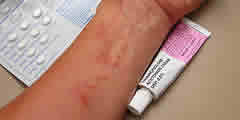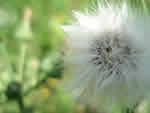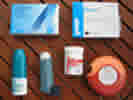If you plan to use herbs for allergy treatment and prevention, you are advised to consult a qualified herbalist for proper dosage and administration. Herbal supplements or herbs, like other medications, may produce side effects or interact with other medications. It is best to follow instructions as prescribed by herbalist or by the product label.
Stinging Nettle (Urtica dioica/Urtica urens)
Stinging nettle has long history as treatment for variety of respiratory conditions, including allergic rhinitis. Though studies have shown favorable results, more research is needed. Discuss with your doctor about whether it is safe for you to try nettle as a possible allergy treatment.
Freeze-dried nettle capsules can be bought from many health food stores. Recommended dose is 600 milligrams per day.
Butterbur (Petasites hybridus)
Butterbur has long been used for the treatment of asthma and bronchitis and to reduce mucus. A study of 125 people with hay fever found that an extract of this herb was as effective and less sedating than cetirizine, a commonly prescribed non-sedating antihistamine. The study lasted only 2 weeks, and while it shows promise, it is not known what would be the effect of using butterbur over a longer time period.
Echinacea (Echinacea angustifolia/Echinacea pallida/Echinacea purpurea)
Professional herbalists may recommend echinacea for allergy treatment especially allergic rhinitis. Test tube and animal studies suggest that echinacea contains substances that enhance the activity of the immune system and reduce inflammation. However, echinacea itself can cause an allergic reaction.
Evening Primrose (Oenothera biennis)
Evening primrose is known as an allergy treatment especially for allergic rhinitis. Its active ingredient is gamma-linolenic acid (GLA), an essential fatty acid that may relieve allergy symptoms (see Nutrition and Dietary Supplement section).
Goldenseal (Hydrastis canadensis)
Goldenseal is traditionally known to be a natural antibiotic and antiseptic. Many herbalists include it in allergy treatment. Many laboratory studies suggest that berberine, the active ingredient in goldenseal, has antibacterial and immune-enhancing properties.
Herbal Tea Bath
Herbal tea bath is also recommended for allergy treatment and prevention. Herbal tea bath is used to calm an overactive immune system. Herbal tea from the blend of calendula flowers, lavender flowers, eyebright flowers, or German chamomile are used. This is prepared 1 day before the planned use, by mixing equal amount of herbs to produce a ¼ mixture. Let it soak to 4 cups of tap water and allow to steep overnight. On the next day boil the mixture. Remove from heat and let it steep for 15 minutes. Strain the herbs and pour the mixture to your bath, then soak.

 Stay indoors as much as possible when pollen counts are at their peak, usually during the mid-morning and early evening, and when wind is blowing pollens around.
Stay indoors as much as possible when pollen counts are at their peak, usually during the mid-morning and early evening, and when wind is blowing pollens around.  Antihistamine drugs:
Antihistamine drugs:
